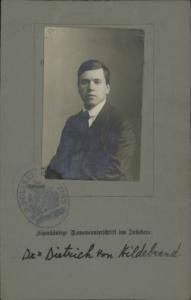Hildebrand and Nazism
To many Germans in the early 1930s, Adolf Hitler looked like just what Germany needed. Here, they imagined, was a charismatic leader capable of restoring social stability, economic prosperity, and national honor to their battered country. Relatively few saw Hitler for what he was--a megalomaniac demagogue driven by racial fantasies that included hatred for Jews and contempt for Christianity.
Dietrich von Hildebrand was one of those few. He discerned the terrifying truth about Hitler and the Nazis from the start, and he did his best to warn his fellow Germans of the impending disaster. Even before the Beer Hall Putsch of 1923--Hitler's abortive attempt to launch a nationwide revolution from Bavaria--von Hildebrand's vocal opposition had landed him on the Nazis' blacklist, slated for execution when they came to power.
In a way, political activism was out of character for this scholarly man, a philosophy professor by trade. But von Hildebrand also was a man of conscience, and having grasped the evil of Nazism before most others, he saw a duty to speak out.
Now the record of that speaking out during a crucial decade and a half leading up to World War II is preserved in a gripping new book, My Battle Against Hitler (Image). The volume has been translated and meticulously edited by John Henry Crosby, founder and director of the Hildebrand Legacy Project, a group devoted to promoting continued study of the life and work of von Hildebrand, and John F. Crosby, professor of philosophy at the Franciscan University of Steubenville.
Today, Dietrich von Hildebrand is perhaps best remembered for his masterful study of the interior life, Transformation in Christ. But the Crosby volume shows that there was much more to his career.
He was born in Florence in 1889, the son of a prominent German sculptor, and prepared for a career in philosophy under the influence of leading figures like Edmund Husserl and Max Scheler. In 1914, he converted to Catholicism and in 1919 began teaching the philosophy of religion at the University of Munich, where students found him a reliable and outspoken guide to resisting the evil intellectual currents of the time. "I tell you the Nazis are the most vicious animals," he said.
Hitler became chancellor of Germany on January 30, 1933. Von Hildebrand, fearing what lay ahead, fled the country and soon found himself in Vienna, where he began publication of a new journal with the specific task of exposing the intellectual and spiritual corruption of Nazism. His efforts moved the German ambassador to declare "that damned Hildebrand" Nazism's greatest obstacle in Austria.
It isn't hard to see why, as this bit of trenchant prose serves to illustrate: "Anyone with the slightest sensitivity…cannot fail to recognize the nature of National Socialism: naturalistic, antagonistic to the things of the spirit, and based on a materialism of blood….The deeds of the National Socialists truly correspond to the spirit of the Antichrist." Among his sorrows was the fact that so many of his fellow Catholics nevertheless failed to understand that.
After Germany annexed Austria in 1938, von Hildebrand escaped, traveled across Europe, and made his way to the United States, where he taught at Fordham University, writing and lecturing widely until his death in 1977. His output includes important studies on ethics and married love, among other topics. My Battle Against Hitler illuminates a critical period of his career not widely known in this country up to now. Old and new Hildebrand fans alike will find it a fascinating read.
- Russell Shaw is the author of more than twenty books. He is a consultor of the Pontifical Council for Social Communications and served as communications director for the U.S. Bishops.



















